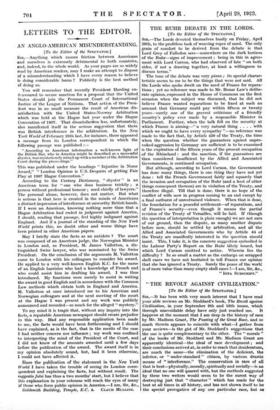LETTERS TO THE EDITOR.
AN ANGLO-AMERICAN MISUNDERSTANDING.
[To the Editor of the SPECTATOR.] SIR,—Anything which causes friction between Americans and ourselves is extremely detrimental to both countries, and, indeed, to the whole world. As your pages are so widely read by American readers, may I make an attempt to dispose of a misunderstanding which I have every reason to believe is doing considerable harm ? Publicity is the best method of doing so.
You will remember that recently President Harding en- deavoured to secure sanction for a proposal that the United States should join the Permanent Court of International Justice of the League of Nations. That action of the Presi- dent was in no small measure the result of American dis- satisfaction with the United States-Norway Arbitration which was held at the Hague last year under the Hague Convention of 1907. That dissatisfaction has, unfortunately, also manifested itself in the serious suggestion that there was British interference in the arbitration. In the New York World of February 28th last, for instance, there appeared a message from its London correspondent in which the following passage was published :—
" According to American information a well-known light of the British Bar, who in America might be described as a successful shyster, was mysteriously mixed up with a member of the Arbitration Court during the proceedings."
This was published under the headings " Injustice in Norse Award," " London Opinion is U.S. Despairs of getting Fair Play at 1907 Hague Convention."
According to the Century Dictionary, " shyster " is an American term for " one who does business trickily ; a person without professional honour ; used chiefly of lawyers." The personal abuse, however, does not matter. But what is serious is that here is created in the minds of Americans a distinct impression of interference at unworthy British hands. If I were an American, knowing nothing more than that a Hague Arbitration had ended in judgment against America, I should, reading that passage, feel highly indignant against England. And if a journal of the standing of the New York World prints this, no doubt other and worse things have been printed in other American papers.
May I briefly state the facts as an antidote ? The court was composed of an American judge, the Norwegian Minister in London and, as President, M. James Vallotton, a dis- tinguished Swiss lawyer, who was nominated by the Swiss President. On the conclusion of the arguments M. Vallotton came to London with his colleagues to consider his award. He applied to a very well-known English K.C. for the name of an English barrister who had a knowledge of French and who could assist him in drafting his award. I was thus introduced. My functions were merely to assist in writing the award in good English and in accordance with the Common Law methods which obtain both in England and America. M. Vallotton at once introduced me to his American and Norwegian colleagues and at the next meeting of the court at the Hague I was present and my work was publicly announced and recorded—so much for the alleged " mystery."
To my mind it is tragic that, without any inquiry into the facts, a reputable American newspaper should create prejudice in this way. Had any responsible application been made to me, the facts would have been forthcoming and I should have explained, as is the fact, that in the merits of the case
I had neither concern nor influence ; my work was confined
to interpreting the mind of the President of the Court, and I did not know of the amounts awarded until a few days before the publication of the award. The award itself is in my opinion absolutely sound, but, had it been otherwise, I could not have affected it.
Since the publication of the statement in the New York World I have taken the trouble of seeing its London corre- spondent and explaining the facts, but without result. The suggestio falsi has thus a two months' start, but I believe that
this explanation in your columns will reach the eyes of many Of those who form public opinion in America.—I am, Sir, &c., Goldsmith Building, Temple, B.C. 4. CLAUD MULLINS.


















































 Previous page
Previous page